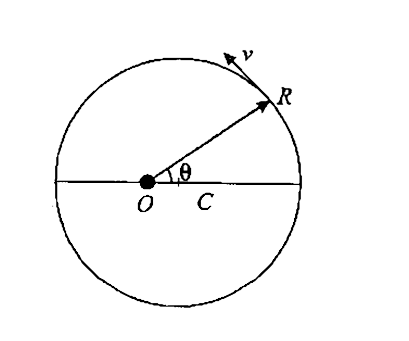A particle revolving in a circular path completes first one third of circumference in 2 sec, while next one third in 1 sec. The average angular velocity of particle will be – ("in "rad//sec)
2π/3
π/3
4π/3
5π/3
Step by step video & image solution for A particle revolving in a circular path completes first one third of circumference in 2 sec, while next one third in 1 sec. The average angular velocity of particle will be – ("in "rad//sec) by Physics experts to help you in doubts & scoring excellent marks in Class 12 exams.
Updated on:21/07/2023Similar Questions
Knowledge Check
A particle is revolving in a circular path as shownin figure in the horizontal plane such that the angular velocity of the particle about the point O is constant and is equal to 1rad/s. Distance of the particle from O is given byR=R0−βt where R0and Bη are constant. The speed ofthe particle,as afunction of time is: ltbrlt
 A√β2+1B(R0−βt)C√β2+(R0−βt)2Dβ
A√β2+1B(R0−βt)C√β2+(R0−βt)2DβA particle comes round a circle of radius 1 m once. The time taken by it is 10 sec . The average velocity of motion is
A0.2πm/sB2πm/sC2m/sDZeroThe displacement of a particle moving in a circular path is given by θ=3t2+0.8, where θ is in radian and t is in seconds . The angular velocity of the particle at t=3 sec . Is
A18 rad/sB15 rad/sC12 rad /sD8 rad /s
A particle moves in east direction with 15m/sec for 2 sec then moves in northward with 5 m/s for 8 sec. A average speed of the particle is :-
View SolutionA particle is revolving in a circular path of radius 25m with constant angular speed 12 rev/min.Then the angular acceleration of the particle is?
View SolutionA particle is revolving in a circular path of radius 25m with constant angular speed 12 rev/min.Then the angular acceleration of particle is
View SolutionWe draw the reference circle of a particle (M) performing a linear S.H.M. If the period of M is 2 sec, then the angular velocity of the reference particle will be
View SolutionA particle is moving along a circular path with uniform speed. Through what angle does its angular velocity change when it completes half of the circular path?
View Solution
